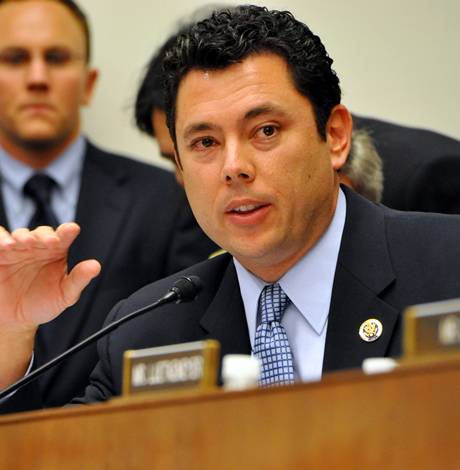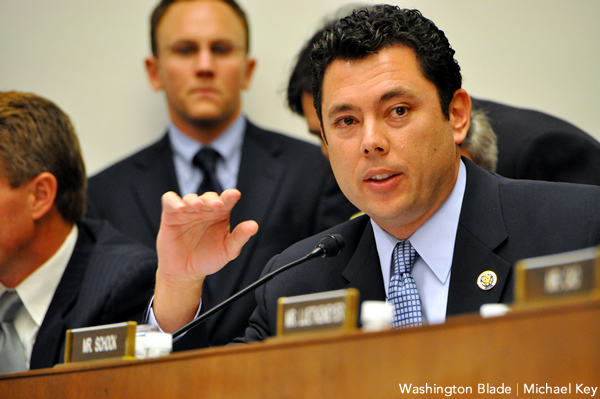News
Hearing in the works for federal ‘religious freedom’ bill
Critics say measure would enable anti-LGBT discrimination


Rep. Jason Chaffetz (R-Utah) is planning a hearing on “religious freedom” legislation for the House Oversight & Government Reform Committee. (Washington Blade file photo by Michael Key)
Congress has mostly stayed out of the “religious freedom” fight as states pass legislation allowing anti-LGBT discrimination for religious reasons, but that may soon change.
A U.S. House committee is planning a hearing on the First Amendment Defense Act, a “religious freedom” bill with the purported purpose of preventing federal government action against individuals and businesses that oppose same-sex marriage for religious reasons. Critics say it essentially carves out a legal exemption for anti-LGBT discrimination.
The legislation was introduced by Rep. Raul Labrador (R-Idaho) in the U.S. House and Sen. Mike Lee (R-Utah) in the U.S. Senate.
M.J. Henshaw, a spokesperson for the House Oversight & Government Reform Committee, said the panel is “working towards a hearing” on the legislation, although no date has been scheduled.
A follow-up email on whether the hearing was likely before the end of this month wasn’t returned. It remains to be seen if a committee vote or consideration on the House floor will follow the hearing.
Chaired by Rep. Jason Chaffetz (R-Utah), the House Oversight & Government Reform Committee is packed with conservative Republicans, including Rep. Steve Russell (R-Okla.), who recently attached to a major defense spending bill an amendment that would undermine President Obama’s executive order prohibiting anti-LGBT workplace discrimination among federal contractors.
The anti-LGBT National Organization for Marriage has been pushing for a hearing on the First Amendment Defense Act in a campaign it calls “Fax for FADA.” The effort encourages supporters to sign a petition in support of the legislation, which triggers a fax sent to House Republican leadership and the House Oversight & Government Reform Committee. According to the National Organization for Marriage’s website, the petition as of Wednesday had 3,870 signatures.
Brian Brown, president of the National Organization for Marriage, wrote in a blog post the “Fax for FADA” effort “is making a big impact.”
“Word is that the First Amendment Defense Act (FADA) will be scheduled for a hearing very soon,” Brown writes. “Our faxes to the House Republican leadership and members of the House Oversight and Government Reform committee are having an impact!”
Upon its introduction last year in an attempt to counter the expected ruling from the U.S. Supreme Court in favor of same-sex marriage nationwide, the First Amendment Defense Act is seen as an attempt to make a carve out into that decision without entirely overturning it.
Among other things, LGBT advocates have said the legislation as introduced would 1) permit a federal employee to refuse to process tax returns, visa applications or Social Security checks for same-sex couples; 2) allow recipients of federal grants and contracts, including those for social services programs like homeless shelters and substance abuse treatment programs, to turn away LGBT people; and 3) permit anyone who believes they have been somehow required by the federal government to approve of married same-sex couples to file a lawsuit and potentially receive damages from taxpayer funds.
Roddy Flynn, executive director of the LGBT Equality Caucus, said the legislation is akin to controversial state anti-LGBT laws recently enacted in North Carolina and Mississippi, calling the planned hearing the latest “in a string of attacks on LGBT people.”
“First North Carolina and Mississippi, then the NDAA amendment, now a hearing on FADA, some lawmakers are determined to permit discrimination at all costs,” Flynn said. “These measures are not about religious liberty or the First Amendment, they are attempts to roll back hard fought protections that provide stability and security to LGBT people. With the incredible backlash against North Carolina’s law, it is shocking some lawmakers are doubling down on this much more radical bill. FADA goes far beyond North Carolina’s anti-LGBT law, giving a license to discriminate for anyone who doesn’t like LGBT people.”
On the Senate side, Lee has presented a new version of the First Amendment Defense Act that limits that carve-out for opponents of same-sex marriage, although the update hasn’t officially been filed.
The new version, which is displayed on Lee’s website, spells out protections from government action won’t apply to publicly traded for-profit entities; federal employees acting within the scope of their employment; federal for-profit contractors acting within the scope of their contracts; and hospitals and nursing homes with respect to visitation, decision-making on health care and certain treatments.
Conn Carroll, a Lee spokesperson, said Tuesday the version of the First Amendment Defense Act on Lee’s website is the “up to date” version of the legislation.
“This finalized version of the First Amendment Defense Act, which we’ve been working with religious liberty experts on for months, makes crystal clear that we are only seeking to prevent federal government discrimination against people and institutions that define marriage as a union between one man and one woman,” Carroll said.
On the House side, Labrador’s office didn’t respond to the Washington Blade’s request to comment on the article or to confirm if the updated Senate version is the new House version as well.
Ian Thompson, legislative representative for the American Civil Liberties Union, said the legislation remains discriminatory against LGBT people regardless of the change.
“It is disappointing that some Republicans in the House have failed to learn the lessons that Governors Pence, McCrory and Bryant now know all too well,” Thompson said. “Embarking down this discriminatory road is going to meet with the swift backlash that it deserves.”
Thompson said one example of discrimination the bill would still allow is permitting certain federal contractors or grantees, including those that provide social services like homeless shelters or drug treatment programs, to turn away LGBT people, same-sex couples or anyone who has a sexual relationship outside of a marriage, such as a single mother.
“Whether in its original or 2.0 versions, FADA is about permitting taxpayer-funded discrimination,” Thompson said. “This legislation is beneath who we are as a nation. I hope that Speaker Ryan and Chairman Chaffetz will reconsider the wisdom of putting such a bright spotlight onto such an ugly, mean-spirited bill.”
Colombia
Colombians protest against Trump after he threatened country’s president
Tens of thousands protested the US president in Bogotá

BOGOTÁ, Colombia — Tens of thousands of people on Wednesday gathered in the Colombian capital to protest against President Donald Trump after he threatened Colombian President Gustavo Petro.
The protesters who gathered in Plaza Bolívar in Bogotá held signs that read, among other things, “Yankees go home” and “Petro is not alone.” Petro is among those who spoke.
The Bogotá protest took place four days after American forces seized now former Venezuelan President Nicolás Maduro and his wife, Cilia Flores, at their home in Caracas, the Venezuelan capital, during an overnight operation.
The Venezuelan National Assembly on Sunday swore in Delcy Rodríguez, who was Maduro’s vice president, as the country’s acting president. Maduro and Flores on Monday pleaded not guilty to federal drug charges in New York.
Trump on Sunday suggested the U.S. will target Petro, a former Bogotá mayor and senator who was once a member of the M-19 guerrilla movement that disbanded in the 1990s. Claudia López, a former senator who would become the country’s first female and first lesbian president if she wins Colombia’s presidential election that will take place later this year, is among those who criticized Trump’s comments.
The Bogotá protest is among hundreds against Trump that took place across Colombia on Wednesday.
Petro on Wednesday night said he and Trump spoke on the phone. Trump in a Truth Social post confirmed he and his Colombian counterpart had spoken.
“It was a great honor to speak with the president of Colombia, Gustavo Petro, who called to explain the situation of drugs and other disagreements that we have had,” wrote Trump. “I appreciated his call and tone, and look forward to meeting him in the near future. Arrangements are being made between Secretary of State Marco Rubio and the foreign minister of Colombia. The meeting will take place in the White House in Washington, D.C.”

District of Columbia
Kennedy Center renaming triggers backlash
Artists who cancel shows threatened; calls for funding boycott grow

Efforts to rename the Kennedy Center to add President Trump’s name to the D.C. arts institution continue to spark backlash.
A new petition from Qommittee , a national network of drag artists and allies led by survivors of hate crimes, calls on Kennedy Center donors to suspend funding to the center until “artistic independence is restored, and to redirect support to banned or censored artists.”
“While Trump won’t back down, the donors who contribute nearly $100 million annually to the Kennedy Center can afford to take a stand,” the petition reads. “Money talks. When donors fund censorship, they don’t just harm one institution – they tell marginalized communities their stories don’t deserve to be told.”
The petition can be found here.
Meanwhile, a decision by several prominent musicians and jazz performers to cancel their shows at the recently renamed Trump-Kennedy Center in D.C. planned for Christmas Eve and New Year’s Eve has drawn the ire of the Center’s president, Richard Grenell.
Grenell, a gay supporter of President Donald Trump who served as U.S. ambassador to Germany during Trump’s first term as president, was named Kennedy Center president last year by its board of directors that had been appointed by Trump.
Last month the board voted to change the official name of the center from the John F. Kennedy Memorial Center For The Performing Arts to the Donald J. Trump And The John F. Kennedy Memorial Center For The Performing Arts. The revised name has been installed on the outside wall of the center’s building but is not official because any name change would require congressional action.
According to a report by the New York Times, Grenell informed jazz musician Chuck Redd, who cancelled a 2025 Christmas Eve concert that he has hosted at the Kennedy Center for nearly 20 years in response to the name change, that Grenell planned to arrange for the center to file a lawsuit against him for the cancellation.
“Your decision to withdraw at the last moment — explicitly in response to the Center’s recent renaming, which honors President Trump’s extraordinary efforts to save this national treasure — is classic intolerance and very costly to a non-profit arts institution,” the Times quoted Grenell as saying in a letter to Redd.
“This is your official notice that we will seek $1 million in damages from you for this political stunt,” the Times quoted Grenell’s letter as saying.
A spokesperson for the Trump-Kennedy Center did not immediately respond to an inquiry from the Washington Blade asking if the center still planned to file that lawsuit and whether it planned to file suits against some of the other musicians who recently cancelled their performances following the name change.
In a follow-up story published on Dec. 29, the New York Times reported that a prominent jazz ensemble and a New York dance company had canceled performances scheduled to take place on New Year’s Eve at the Kennedy Center.
The Times reported the jazz ensemble called The Cookers did not give a reason for the cancellation in a statement it released, but its drummer, Billy Hart, told the Times the center’s name change “evidently” played a role in the decision to cancel the performance.
Grenell released a statement on Dec. 29 calling these and other performers who cancelled their shows “far left political activists” who he said had been booked by the Kennedy Center’s previous leadership.
“Boycotting the arts to show you support the arts is a form of derangement syndrome,” the Times quoted him as saying in his statement.
District of Columbia
New interim D.C. police chief played lead role in security for WorldPride
Capital Pride says Jeffery Carroll had ‘good working relationship’ with organizers

Jeffery Carroll, who was named by D.C. Mayor Muriel Bowser on Dec. 17 as the city’s Interim Chief of Police, played a lead role in working with local LGBTQ community leaders in addressing public safety issues related to WorldPride 2025, which took place in D.C. last May and June
“We had a good working relationship with him, and he did his job in relation to how best the events would go around safety and security,” said Ryan Bos, executive director of Capital Pride Alliance.
Bos said Carroll has met with Capital Pride officials in past years to address security issues related to the city’s annual Capital Pride parade and festival and has been supportive of those events.
At the time Bowser named him Interim Chief, Carroll had been serving since 2023 as Executive Assistant Chief of Specialized Operations, overseeing the day-to-day operation of four of the department’s bureaus. He first joined the D.C. Metropolitan Police Department in 2002 and advanced to multiple leadership positions across various divisions and bureaus, according to a statement released by the mayor’s office.
“I know Chief Carroll is the right person to build on the momentum of the past two years so that we can continue driving down crime across the city,” Bowser said in a statement released on the day she announced his appointment as Interim Chief.
“He has led through some of our city’s most significant public safety challenges of the past decade, he is familiar with D.C. residents and well respected and trusted by members of the Metropolitan Police Department as well as our federal and regional public safety partners,” Bowser said.
“We have the best police department in the nation, and I am confident that Chief Carroll will meet this moment for the department and the city,” Bowser added.
But Bowser has so far declined to say if she plans to nominate Carroll to become the permanent police chief, which requires the approval of the D.C. City Council. Bowser, who announced she is not running for re-election, will remain in office as mayor until January 2027.
Carroll is replacing outgoing Chief Pamela Smith, who announced she was resigning after two years of service as chief to spend more time with her family. She has been credited with overseeing the department at a time when violent crime and homicides declined to an eight-year low.
She has also expressed support for the LGBTQ community and joined LGBTQ officers in marching in the WorldPride parade last year.
But Smith has also come under criticism by members of Congress, who have accused the department of manipulating crime data allegedly showing lower reported crime numbers than actually occurred. The allegations came from the Republican-controlled U.S. House Oversight Committee and the U.S. Justice Department
Bowser has questioned the accuracy of the allegations and said she has asked the city’s Inspector General to look into the allegations.
Meanwhile, a spokesperson for the D.C. police Office of Public Affairs did not immediately respond to a question from the Washington Blade about the status of the department’s LGBT Liaison Unit. Sources familiar with the department have said a decline in the number of officers currently working at the department, said to be at a 50-year low, has resulted in a decline in the number of officers assigned to all of the liaison units, including the LGBT unit.
Among other things, the LGBT Liaison Unit has played a role in helping to investigate hate crimes targeting the LGBTQ community. As of early Wednesday an MPD spokesperson did not respond to a question by the Blade asking how many officers are currently assigned to the LGBT Liaison Unit.
-

 Photos5 days ago
Photos5 days agoThe year in photos
-

 Sponsored4 days ago
Sponsored4 days agoSafer Ways to Pay for Online Performances and Queer Events
-

 District of Columbia3 days ago
District of Columbia3 days agoTwo pioneering gay journalists to speak at Thursday event
-

 a&e features3 days ago
a&e features3 days agoQueer highlights of the 2026 Critics Choice Awards: Aunt Gladys, that ‘Heated Rivalry’ shoutout and more




















